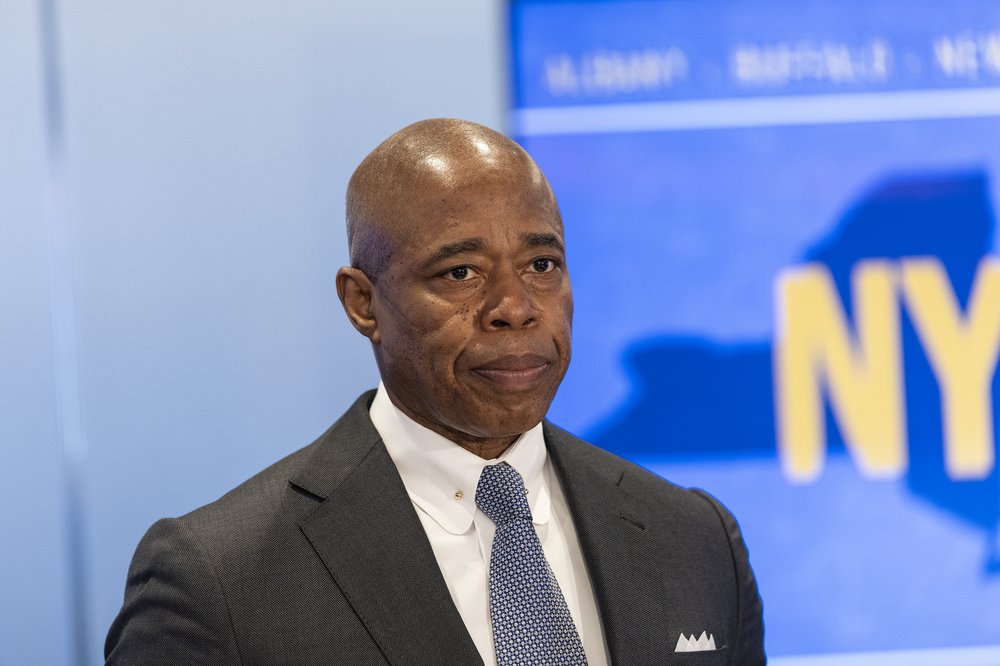Mayor Adams presses state to cover half of migrant expenses on annual budget trip to Albany
Feb. 6, 2024, 2:16 p.m.
The mayor embarked on Tin Cup Day in a more politically vulnerable position than previous years.

New York City Mayor Eric Adams asked the state to shoulder half the city’s costs for sheltering tens of thousands of migrants on Tuesday, and told state lawmakers that he’s all but given up on convincing the federal government to pick up a greater share.
“Despite our efforts, we cannot assume that they will give us any more,” Adams said during a hearing in Albany.
Administration officials estimate that the city will spend around $10 billion on migrants through June 2025. Between the current state budget and Gov. Kathy Hochul’s proposal for the coming fiscal year, the state has committed to spending $4.3 billion on migrant housing and legal costs — including $3 billion in direct reimbursements for the city. Adams said the federal government has awarded the city $156 million, but the “vast majority” of that sum has yet to be disbursed.
His plea came on “Tin Cup Day,” an annual tradition in which the mayor goes to Albany to plead for resources and endure hours of grilling from state legislators. Adams came to this year’s hearing more politically vulnerable than in the past amid low approval ratings, a budget and migrant crisis, and an emboldened City Council that overrode his vetoes on two criminal justice bills last week.
Adams wasted little time in requesting more migrant aid. Last year, he also proposed that the state cover half of the migrant-associated spending, only to have state lawmakers agree to split the cost three ways with the city and federal governments. But ongoing congressional deadlock over immigration has made federal assistance unlikely.
“We never thought we would get a third from the federal government,” Adams told lawmakers on Tuesday.
City Comptroller Brad Lander, who often clashes with Adams and was also in Albany to testify on Tuesday, called the mayor’s proposal “entirely reasonable.”
“Look, I'd be delighted if we were in a world where the federal government paid a third, the state paid a third and the city paid a third,” Lander said in an interview. “Unfortunately, with Republicans, MAGA Republicans, in control of the House, that's not going to happen.”
The city says 173,000 migrants have arrived in New York since spring 2022, and more than 67,000 of them are currently in the shelter system.
The mayor has spent months publicly scolding the Biden administration for not providing more funding and assistance. Republicans who argue that the White House's immigration policy has failed have seized on Adams' comments, which include assertions that the migrant crisis would “destroy” the city.
When he was asked on Tuesday about whether he saw an end to the migrant crisis, the mayor replied, “No, I don’t see relief in sight.”
Senate Majority Leader Andrea Stewart-Cousins, a Yonkers Democrat, was skeptical about Adams' push for more state aid, and said it could mistakenly send the signal that the state and city are no longer seeking federal funding.
“I think, as a state, we are continuing to try and find ways to be assisting as the mayor and the city deals with this,” Stewart-Cousins said. “But I don’t think it’s a good idea to let the federal government off the hook.”
In response to Adams' ask, Hochul spokesperson Avi Small touted $4.3 billion the governor has flagged for migrant care over two years. He said the governor is continuing to "pressure Congressional Republicans to deliver resources and policy changes that will finally end this crisis."
Tuesday’s hearing featured a host of other topics, some of which seemed designed to make Adams squirm. He was asked when tents for migrants would be removed, why the buildout of bus lanes has been so slow, and about budget cuts to libraries and schools.
In the wake of a video showing migrants attacking police officers in Times Square, Republican lawmakers pressured Adams to say whether he would revoke the city’s sanctuary status and make it easier for federal Immigration and Customs Enforcement officials to deport migrants.
Adams, who has sought to emphasize his identity as a law-and-order mayor, said he had no such authority and that the power to change the law rests with the City Council.
Among the biggest issues looming over Adams is whether state lawmakers will agree to extend his control of city schools when it expires in June. It comes as education advocates and communities in large school districts across the country call for a new system of school governance.
Adams has faced increased scrutiny over cuts to schools, and he has cited higher test scores and graduation rates as some of the reasons why he should be allowed to retain mayoral control.
Assemblymember Jessica Gonzalez-Rojas of Queens said she was concerned about how the cuts were affecting city schools, and pointed to one of her child’s teachers who had been let go as an example of how the system had lost talented educators.
“I ask this as a mom: Why should we trust you?” she said.
The morning was not without fireworks. At one point, Assemblymember Zohran Mamdani asked Adams why he had not called for a cease-fire in the Israel-Hamas war.
"How many more Palestinians have to be killed for you to call for a cease-fire?" Mamdani said.
Adams said he had been consistent in demanding that hostages be returned and that “no innocent family should die — on the Palestinian side, or the Israeli side.”
The mayor bristled at the suggestion that he had not spoken up for marginalized communities.
"I have a solid record, brother,” he told Mamdani. “And you cannot come up against it.”
This story has been updated with comment from Gov. Kathy Hochul's office.
How NYC Mayor Eric Adams lost a major bill battle and alienated key allies